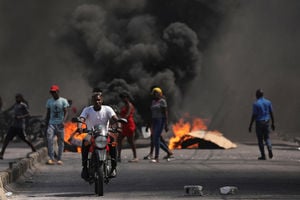
A demonstrator holds up a Haitian flag during a protest against Prime Minister Ariel Henry's government and insecurity, in Port-au-Prince, Haiti March 1, 2024. (Inset) Haitian Prime Minister Ariel Henry.
Africa must carry Haiti out of the current crisis – but not in the mechanical way of sending US-backed troops. What we see in Haiti are the effects of the cycle of foreign interventions that have complicated the Haitian problem rather than solved it.

Haitian Prime Minister Ariel Henry lands in Nairobi to push for Kenyan police deployment.
The story of Haiti is the sorry story of the Blacks in Western countries. It is a long history, and Haitians continue to pay – some say – for starting the revolt that ended slavery. For starters, Haiti was the site of the first successful anti-slavery revolt, and the blacks there fought attempts to enslave them again.
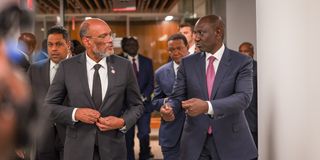
President William Ruto and Haitian Prime Minister Ariel Henry at State House, Nairobi on Friday.
It was also the first nation to ban slavery at a time when many of the Western nations were relying on forced black labour – whether in African colonies or in the new African diaspora – to build their economies.
In Haiti, and for many years, the French perceived the island, then known as Saint-Dominque, as their most important possession. Here, they forced the enslaved Africans – kidnapped from Africa and sold – to grow sugar and coffee for the global market.
After the Haitian Revolution of 1791 to 1804 ended slavery on the island, the major powers refused to recognise Haiti’s independence from France. For instance, it took 60 years for the US to grant diplomatic recognition to the new nation. As such, the new nation remained isolated, and there were international blockades to slow down its progress deliberately. The heroes of that revolution are Toussaint Louverture and Jean-Jacques Dessalines.
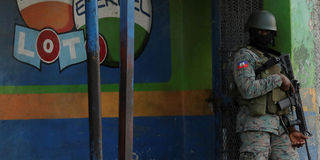
A Haitian soldier stands guard near the Toussaint Louverture International Airport after a shootout with armed gangs around the airport as the government declared a state of emergency amid violence, in Port-au-Prince, Haiti, March 4, 2024.
For that revolt, France claimed that its properties (including slaves) had been lost and demanded to be paid for its loss of the colony. The imposed indemnity was calculated as 150 million gold francs in 1825 and was done as the French navy sailed to Haiti to demand payment. This was estimated as 300 per cent of Haiti’s economy at that time. Haiti struggled to pay France as the world watched as the nation suffered and was left with no capital to finance its infrastructure and other services.
As a result, compared with other island nations, Haiti was lagging in development. It sold government land, borrowed from the domestic market, and put exorbitant taxes on its exports – sugar and coffee. At times, it took new loans, at higher interest rates and commissions, to settle the old loans. So lucrative was this loan venture that a National Bank of Haiti was set up in Paris in 1881 and controlled the Haiti currency. At that time, even in Haiti, some people thought this was a friendly venture. It wasn’t.
As the New York Times later revealed, “The National Bank of Haiti, on which so many hopes were pinned … was national in name only. Far from an instrument of Haiti’s salvation, the central bank was, from its very inception, an instrument of French financiers and a way to keep a suffocating grip on a former colony into the next century.” And so, as the central bank of Haiti was set up by a French bank, Crédit Industriel, and as the New York Times wrote: “Its exploits in Haiti left a crippling legacy of financial extraction and dashed hopes… (and) siphoned millions of dollars from Haiti.”
This bank would later be known as The National Bank of the Republic of Haiti formed by a consortium of French, German and American interests. In essence, these nations were running the Haiti economy – until it repaid the French debts.
All that time, the nation was forced to borrow money from French banks to finance the claims – negotiated as French gunboats were threatening to bomb the island. It was not until 1947 that all loans related to that indemnity were paid. The effect of all that was one of the poorest nations on Earth.
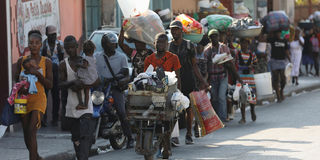
People flee their homes as police confront armed gangs after prominent gang leader Jimmy Cherizier called for Haiti's Prime Minister Ariel Henry's government to be toppled, in Port-au-Prince, Haiti, February 29, 2024.
It has been a site of perpetual frustration, violence, collapsing systems, and a corrupt elite. Money would be borrowed for development, and more than 40 per cent would go to paying bank commissions and fees. The elite swindled the balance – the betrayers who lived large in Paris after signing loans and earning accolades from the National Bank. As historians say, besides the French and Americans, Haiti’s misfortunes were also the result of its corrupt elite.
As one historian rightly observed, Haiti’s sovereign debt was demanded by force and with threats of an invasion as France sent its gunboats to demand payment. It was also done by corrupting the local elites to agree to the transfer, and in return they could also freely loot. The third was enforced by international financial institutions in both France and US, which loaned money to Haiti to keep it indebted.

A demonstrator holds up a Haitian flag during a protest against Prime Minister Ariel Henry's government and insecurity, in Port-au-Prince, Haiti March 1, 2024.
And France is not the only culprit. The US next door invaded Haiti in July 1915, to ostensibly restore order, and they did not leave until 1934. Haiti was in a constant state of French debt, and it controlled the country’s finances and trade – until its debts were fully paid. Also, the Woodrow Wilson government withdrew some money from the National Bank for safekeeping in New York in 1914.
This was followed by a ground invasion of Haiti, which led to the signing of the Haitian-American Treaty of 1915. This invasion gave Americans total control of Haiti, and they managed to supervise a general election and installed a puppet regime led by Philippe Sudré Dartiguenave.
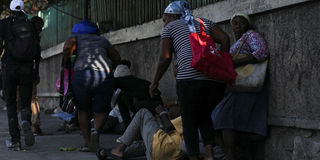
People flee as police officers clash with gangs during a protest against Prime Minister Ariel Henry's government and insecurity, in Port-au-Prince, Haiti March 1, 2024.
The pro-US government gave Washington the right to intervene in Haiti whenever it deemed necessary – and Haitians have always resisted this. However, when Parliament refused to pass a law allowing foreign land ownership, the US forced President Dartguenave to dissolve it in June 1917. It never met again until 1929!
In between was the infamous 29-year dictatorship of “Papa Doc” François Duvalier and his successor son “Baby Doc” Jean-Claude Duvalier between 1957 and 1986. While the election of Jean-Bertrand Aristide is hailed as the most democratic, he was deposed twice. He always blamed the US for the coup – especially the 2004 one that forced him into exile in the Central African Republic and later South Africa. The current president, Ariel Henry, was part of the anti-Aristide group that benefited from his ouster.
That the US has always wanted to control events in Haiti is known and has a long history. As the Foreign Policy journal suggested recently, the US is trying to “outsource the invasion” of Haiti by paying Kenya police to control the Port-au-Prince streets. Henry took over after the assassination of President Jovenel Moise in July 2021. However, Henry was not ratified by Parliament since it was non-existent after President Moise let every member’s term lapse. Currently, Haiti has no elected Parliament.

A masked man calls on demonstrators to stop during a protest against Prime Minister Ariel Henry's government and insecurity, in Port-au-Prince, Haiti March 1, 2024.
Foreign Policy magazine has argued that Kenya was not President Biden’s first choice. Initially, he wanted Canada to lead, but Prime Minister Justin Trudeau, argued that the past interventions had not worked.
The US then turned to Brazil, but its president, Luiz Inácio Lula da Silva, turned down the request. The only option was to turn to Kenya “with the promise of funding for the mission as well as a five-year defense cooperation agreement”.
Read: The gangs running Haiti
That is why Haiti Prime Minister Ariel Henry was last week in Nairobi to sign an agreement on deploying 1,000 Kenyan policemen in Haiti. But he was unable to land back after what the Western media calls “gangs” seized the international airport in the capital, Port au Prince.
Stabilising Haiti is an international priority – and for the sake of its diaspora, African nations must take an interest in the Haiti issue. But more than that is to demand that France repay the money it stole from Haiti after it lost the colony. Economic desperation has pushed most Haitians into the streets, and we must address the indemnity question – the same way President Jean-Betride Aristide envisaged before he was deposed.




